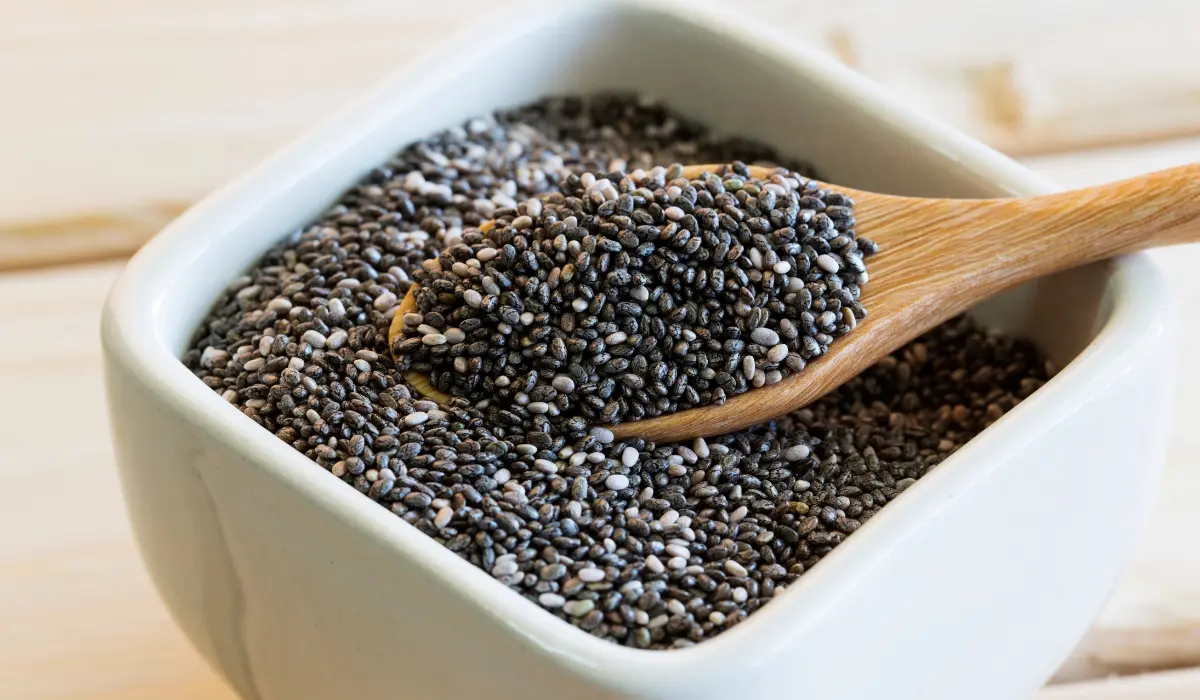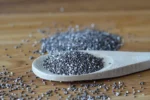I’ve been in the field of nutrition for years, and I’ve seen superfoods rise and fall in popularity. But chia seeds are one of the few that have stood the test of time, not because they’re trendy, but because they truly deliver results.
I’ve watched clients experience better digestion, more stable energy, and noticeable improvements in their overall health just by adding these tiny seeds to their daily routine.
When we talk about chia seeds, we’re talking about one of the most nutrient-dense foods you can eat for the calorie count.
They’re versatile, easy to use, and pack benefits that touch almost every system in your body. In my own life and in my practice, I’ve seen how a daily dose can create lasting changes. So, let’s explore what might happen to your body if you commit to eating chia seeds every day.
Nutritional Content of Chia Seeds
Every time I recommend chia seeds, I start with their nutrient profile, because it’s impressive. In just two tablespoons, you get a healthy dose of omega-3 fatty acids, around 10 grams of fiber, plant-based protein, calcium, magnesium, phosphorus, and a solid mix of antioxidants.
That’s a lot of nutrition for such a small amount of food, and it’s one of the reasons I call them a “nutritional amplifier.”
Unlike some seeds, chia seeds are easy for the body to absorb without grinding. That means you get direct access to all those nutrients without extra preparation.
They’re also naturally gluten-free and suitable for most diets, which makes them accessible for almost everyone.
I often compare their nutrient density to that of salmon, spinach, or almonds, but chia seeds offer a unique blend that hits multiple health needs at once.
This nutrient combination explains why daily consumption can have such broad effects. You’re not just getting one benefit, you’re fueling your body with components that work together to improve digestion, metabolism, energy levels, and even skin health. Over time, this steady supply of nutrients builds a foundation for long-term wellness.
Impact on Digestive Health and Gut Function
One of the first things people notice when they start eating chia seeds daily is improved digestion. That’s because they’re loaded with soluble fiber, which swells when mixed with liquid, forming a gel-like consistency.
This not only adds bulk to your stool but also helps it move smoothly through the digestive tract. For clients struggling with constipation, chia seeds often bring noticeable relief within days.
Fiber does more than keep things moving, it feeds the beneficial bacteria in your gut. This supports a healthier microbiome, which is tied to better immunity, mood regulation, and even weight management.
A balanced gut environment can reduce bloating and digestive discomfort, leaving you feeling lighter and more comfortable day to day.
That said, chia seeds need water to do their job properly. If you eat them dry without increasing your fluid intake, you may experience the opposite effect: bloating, cramping, or constipation.
My advice is to soak them before eating or pair them with water-rich foods like smoothies or yogurt, especially if you’re new to high-fiber foods.
Influence on Energy and Satiety Levels
I’ve found chia seeds to be a natural energy stabilizer. Thanks to their blend of complex carbs, fiber, protein, and healthy fats, they provide a slow and steady release of energy rather than a quick spike followed by a crash.
I’ve had busy days where a chia pudding in the morning carried me through hours without feeling that mid-morning slump.
The satiety effect is another big plus. Because chia seeds expand in liquid, they physically fill you up, while the protein and fat content keep hunger hormones in check.
Clients who add chia seeds to their breakfast often report snacking less throughout the day. This isn’t about willpower, it’s about giving your body the nutrients it needs to feel satisfied.
Stable blood sugar plays a key role here, too. The fiber in chia seeds slows the absorption of sugar into your bloodstream, preventing those post-meal crashes that can sap your focus and make you crave junk food. Over time, this kind of balance can help regulate appetite and support healthier eating patterns naturally.
Cardiovascular and Metabolic Benefits
Heart health is one of the areas where chia seeds truly shine. The omega-3 fatty acids they contain, particularly alpha-linolenic acid (ALA), have anti-inflammatory effects that can help reduce arterial stiffness and lower triglyceride levels.
I’ve seen clients with borderline cholesterol numbers move into healthier ranges after a few months of incorporating chia seeds alongside other dietary changes.
Antioxidants in chia seeds also protect the heart by preventing oxidative damage to blood vessels. This, combined with the fiber’s ability to help lower LDL (“bad”) cholesterol, creates a protective effect that’s hard to ignore.
Regular intake may also modestly lower blood pressure, especially in people whose diets were previously low in omega-3s.
On the metabolic side, chia seeds can improve insulin sensitivity, which is a major factor in preventing type 2 diabetes.
By keeping blood sugar stable, they help reduce the constant stress on the pancreas, which over time can preserve metabolic function and lower chronic disease risk.
Effects on Weight Management and Body Composition
Many people initially try chia seeds for weight loss, and while they’re not a magic solution, they can be a valuable tool. By promoting satiety and regulating appetite, they make it easier to stick to a calorie-appropriate eating plan without feeling deprived.
I’ve had clients lose inches from their waistline simply by swapping processed snacks for chia-based alternatives.
Protein is key in weight management, especially when it comes to preserving lean muscle mass during calorie restriction.
Chia seeds provide plant-based protein that supports muscle repair and maintenance, which is essential for keeping metabolism steady as you lose fat.
It’s important to be realistic: chia seeds support weight management best when they’re part of a balanced diet and active lifestyle.
Eating them daily won’t override the effects of poor food choices or inactivity, but they can make the journey easier and more sustainable.
Benefits for Bone and Joint Health
As we age, maintaining strong bones becomes a priority, and chia seeds deliver on that front. They’re a rich source of calcium, phosphorus, and magnesium, all essential minerals for bone density.
In fact, gram for gram, chia seeds contain more calcium than dairy milk, making them especially valuable for people who avoid dairy.
Their omega-3 content also benefits joints by reducing inflammation that can cause stiffness and pain. I’ve recommended chia seeds to active clients, older adults, and those with early signs of arthritis, and many report improved mobility over time.
Pairing chia seeds with other nutrient-rich foods like leafy greens or fortified plant milks can amplify their bone-protecting benefits. Think of them as part of a long-term investment in your skeletal health, something you’ll thank yourself for in the decades ahead.
Skin Health and Cellular Repair
From a skin perspective, chia seeds are an underrated ally. Their antioxidants combat oxidative stress, which is a major contributor to premature aging. This helps keep your skin looking vibrant and youthful for longer.
The omega-3s also play a role in maintaining the skin’s lipid barrier, which keeps moisture in and irritants out. I’ve noticed my own skin feels more hydrated and supple when I’m consistent with my chia intake, and some clients have seen reduced redness and improved skin tone.
Because chia seeds also help regulate inflammation internally, they may indirectly benefit skin conditions like acne or eczema. While they’re not a cure, they can support the body’s natural healing processes and promote a healthier complexion over time.
Potential Side Effects and Considerations
While chia seeds are safe for most people, there are a few things to watch for. Their high fiber content means that introducing them too quickly can cause bloating, gas, or discomfort, especially if your diet is currently low in fiber. I recommend starting with a teaspoon or two a day and working your way up.
If you’re on blood-thinning medication, talk to your doctor before significantly increasing chia seed intake. The omega-3 content can have a mild blood-thinning effect, which may amplify medication effects. This is rarely an issue for most people, but it’s worth being aware of.
Finally, portion control matters. Two tablespoons a day is plenty for most adults. Beyond that, you’re not necessarily getting more benefit, and you may end up adding unnecessary calories to your diet without realizing it.
Final Thought
In my professional and personal experience, eating chia seeds every day can make a measurable difference in your health. From better digestion to improved heart markers, more stable energy, and even healthier skin, their benefits are broad and impactful.
But remember, chia seeds aren’t a silver bullet, they’re a tool. The magic happens when you combine them with a balanced diet, regular activity, and consistent healthy habits. Small, daily actions like this can compound into remarkable changes over time.
So, if you’re looking for one simple habit to start today, a spoonful of chia seeds might just be one of the easiest and most rewarding choices you make.
FAQs
Most people notice digestive changes within a week, while improvements in energy, skin, or cholesterol can take several weeks to a few months. Yes, in moderate amounts. They’re nutrient-rich and safe for most people, but it’s wise for pregnant women to introduce them gradually and consult their healthcare provider. Anytime works, but many people enjoy them at breakfast for sustained energy or in the evening as part of a light, satisfying snack. No. While nutrient-dense, they don’t provide all the vitamins and minerals your body needs. They work best as part of a diverse, balanced diet. How long does it take to see noticeable benefits from daily chia seed intake?
Are chia seeds safe for children and pregnant women?
What’s the best time of day to consume chia seeds?
Can chia seeds replace a multivitamin?




